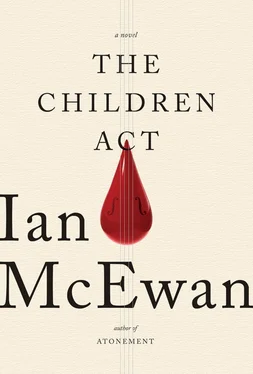She had a north Londoner’s ignorance of and disdain for the boundless shabby tangle of London south of the river. Not a Tube stop to give meaning and relation to a wilderness of villages swallowed up long ago, to sad shops, to dodgy garages interspersed with dusty Edwardian houses and brutalist apartment towers, the dedicated lairs of drug gangs. The pavement crowds, adrift in alien concerns, belonged to some other, remote city, not her own. How would she have known they were passing through Clapham Junction without the faded jokey sign above a boarded-up electrical store? Why make a life here? She recognized in herself the signs of an enveloping misanthropy and made herself remember her mission. She was visiting a seriously ill boy.
She liked hospitals. When she was thirteen, a keen high-speed cyclist to school, a slotted drain cover caused her to fly over her handlebars. A brief concussion and traces of blood in her urine kept her in hospital for observation. There was no room in the pediatric ward—a coachful of schoolchildren had returned from Spain with an unidentified stomach virus. She was put in with the women and remained among them for a week of undemanding tests. This was the mid-1960s, when the spirit of the times had not yet begun to question and unpick the starchy medical hierarchies. The high-ceilinged Victorian ward was clean and orderly, the frightening ward sister protective toward her youngest patient, and the old ladies, some of whom, it was clear in retrospect, were in their thirties, adored and cared for Fiona. She never considered their ailments. She was their pet and she was lost to a new existence. Her old routines of home and school dropped away. When one or two nice ladies vanished from their beds during the night she didn’t think about it much. She was well protected from hysterectomies, cancer and death, and passed a glorious week without alarm or pain.
In the afternoons, after school, her friends would come, awed to be making a grown-up independent hospital visit. When the awe wore off, three or four girls would be round Fiona’s bed shaking and clucking with held-down laughter at nothing much at all—a nurse striding by with a frown, the over-earnest greeting of an ancient lady with no teeth, someone at the far end of the ward being raucously sick behind a screen.
Before and after lunch, Fiona would sit alone in the day room with an exercise book on her lap, planning futures for herself—a concert pianist, a vet, a journalist, a singer. She made flowcharts of possible lives. The trunk lines branched through university, heroic chunky husband, dreamy children, sheep farm, the eminent life. Back then she had not yet thought of the law.
On the day she was discharged, she went round the ward in school uniform, satchel swinging from her shoulder, watched by her mother, making tearful farewells and promises to stay in touch. In the decades that followed she was lucky in her health, and only ever in hospital during visiting hours. But she was marked for good. Whatever suffering and fear she saw in family and friends could not dislodge an improbable association of hospitals with kindness, with being noted as special and sheltered from the worst. So now, inappropriately, as the twenty-six-story Edith Cavell Wandsworth General rose above the misty oak trees on the far side of the common, she experienced a moment of pleasurable anticipation.
She and the social worker looked ahead, past the stuttering windscreen wipers, as the taxi approached a blue neon sign which announced remaining space for six hundred and fifteen cars. On a grassy rise, as on a Stone Age hill fort, stood the Japanese-designed circular tower of glass, with cladding of surgical-scrubs green, built with expensively borrowed money, back in the carefree days of New Labour. The highest floors were lost to the low-slung summer cloud.
As they walked toward the entrance a cat ran out in front of them from under a parked car and Marina Greene opened the conversation again to give a full account of her own cat, a bold British Shorthair that saw off all the dogs in the neighborhood. Fiona warmed to this solemn young woman with the thin sandy hair who lived in a council house with her three children under five and her policeman husband. Her cat was beside the point. She was not letting anything prejudicial pass between them, but was sensitively aware of the shared concern they were about to confront.
Fiona allowed herself more freedom. She said, “A cat that stands its ground. I hope you’ve told young Adam that story.”
Marina said quickly, “I have, actually,” and fell silent.
They entered a glassed-in atrium the height of the entire building. Mature native trees, rather starved, pushed hopefully upward from the concourse, from among the cheerful chairs and tables of competing coffee and sandwich concessions. Higher up, then even higher, other trees rose from concrete platforms cantilevered into the curving walls. The remotest plants were shrubs silhouetted against the glass roof three hundred feet up. The two women went across the pale parquet, past an information center and an exhibition of unwell children’s art. The long straight run of an escalator brought them to a mezzanine, where a bookshop, florist, newsagent, gift shop and business center were ranged around a fountain. New Age music, airy and unmodulating, merged with the sound of tinkling water. The model was, of course, the modern airport. With altered destinations. At this level there was little sign of illness, none of medical equipment. The patients were finely spread between visitors and staff. Here and there were people in dressing gowns, looking rakish. Fiona and Marina followed signs with motorway lettering. PEDIATRIC ONCOLOGY, NUCLEAR MEDICINE, PHLEBOTOMY. They turned down a wide polished corridor that brought them to a bank of elevators and rode up in silence to the ninth floor, where an identical corridor took them through three left turns toward Intensive Care. They passed a jolly mural of apes swinging through a forest. Now, at last, the uncirculated air tasted of hospital, of cooked food long removed, antiseptic and, fainter, something sweet. Neither fruit nor flowers.
The nurses’ station faced protectively onto a semicircular array of closed doors, each one with an observation window. The silence, broken only by an electric hum, and the lack of natural light made it feel like the small hours. The two young nurses on the desk, one Filipina, Fiona later learned, the other Caribbean, exclaimed and greeted Marina with high fives. Suddenly the social worker was a different person, an animated black woman in a white skin. She spun round to introduce the judge to the young nurses as “truly high up.” Fiona put out her hand. She could not have performed a high five without withering self-consciousness, and that seemed to be understood. Her hand was taken warmly. In a rapid exchange at the desk it was agreed that Fiona would remain outside while the social worker went in and explained things to Adam.
When Marina had gone through a door to the far right, Fiona turned to the nurses and asked about their young patient.
“He’s learning the violin,” the young Filipina woman said. “And driving us crazy!”
Her friend theatrically slapped her thigh. “He’s strangling a turkey in there.”
The nurses looked at each other and began to laugh, but quietly, out of consideration for their patients. This was clearly an old and coded joke. Fiona waited. She was feeling at home, but she knew it wouldn’t last.
Finally she said, “What about this transfusion business?”
All humor vanished. The Caribbean nurse said, “I pray for him every day. I say to Adam, ‘God don’t need you to do this, darlin’. He loves you anyway. God wants you to live .’”
Her friend said sadly, “He’s made up his mind. You got to admire him. Living for his principles, is it.”
Читать дальше












